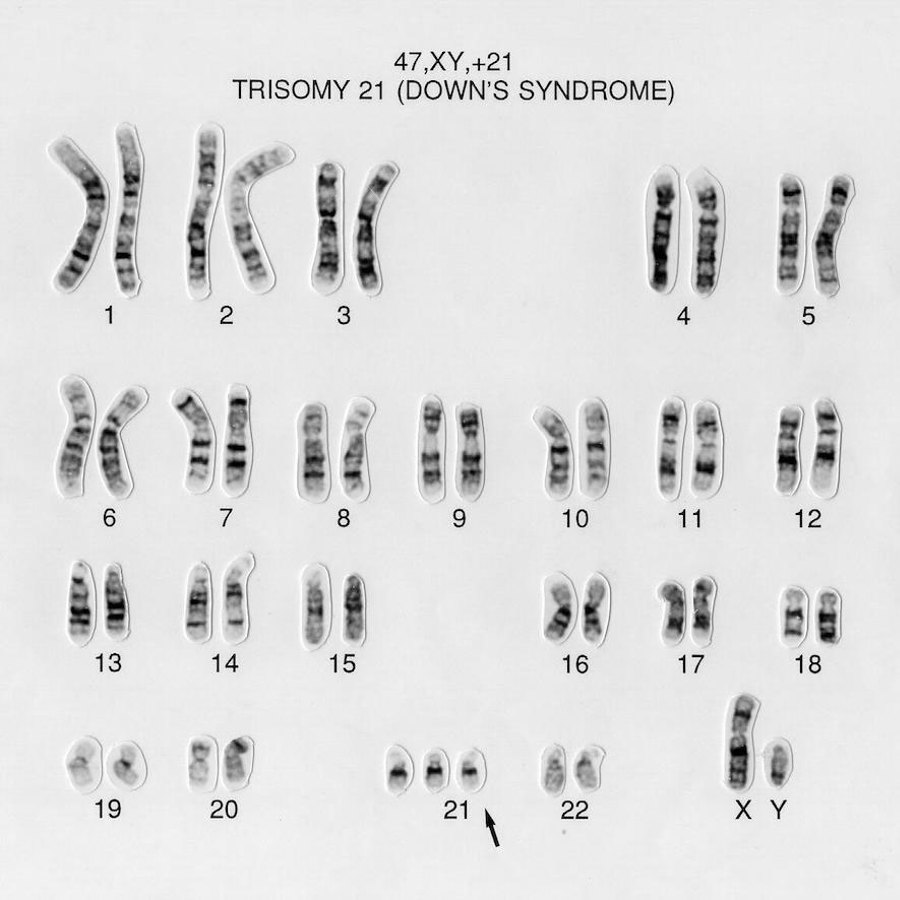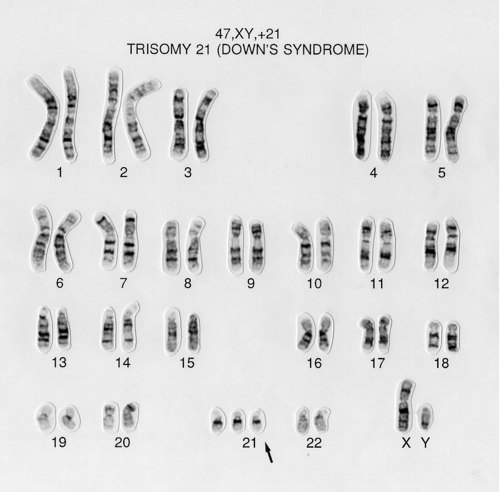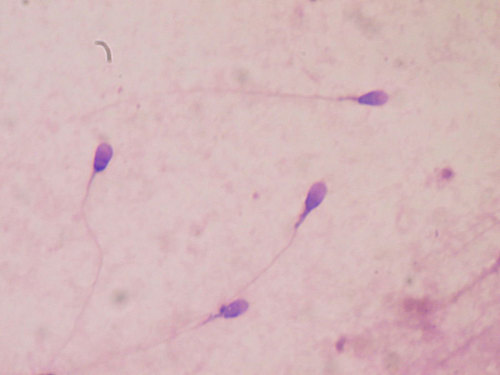
Are the genes we pass on to our children affected by the age we conceive?
January 11, 2006

- Related Topics:
- Reproduction,
- Aging,
- Chromosomes,
- Developmental biology,
- Genetic conditions,
- Trisomy/Aneuploidy
A curious adult from California asks:
“Are the genes we pass on to our children affected by the age we conceive? Are our children more likely to have genetic issues if their parents are older? Can the age of the father or mother influence the child's development?”
The answer is yes for both women and men. The older the parent, the higher the risk for some sort of genetic problem.
Now don’t get me wrong. Just because a parent is old it doesn’t mean their children will have genetic problems for sure. The risk just goes up. And the kind of risk depends on whether the problem is with mom's eggs or dad’s sperm.
When mom’s eggs get a problem, it tends to be big. Bad eggs usually end up with extra or missing chromosomes (or big pieces of them).
A chromosome is a long stretch of DNA that has a lot of genes on it. So when you get an extra chromosome or one goes missing, you end up with a big change in the number of your genes. And this usually means big problems.
This is why older women have more miscarriages and kids with Down syndrome. An extra chromosome 21 causes Down syndrome. Most of the other chromosomal problems are so big that the fetus doesn't survive – the pregnancy ends in miscarriage.

So that is what can happen with an older woman’s egg. But what about an older man's sperm? Can his sperm cause problems too? Yes.
The sperm of older men tend to have smaller changes than those found in an older woman’s egg. Instead of all of those extra genes, an older man’s sperm usually has changes in single genes. And this means different problems for the children of older dads.
A British study showed that fathers over 50 were three times more likely to have a child with schizophrenia than 25-year-old dads. Between the ages of 45 and 49, the chances were twice as likely.1 Dads over 50 are also six times more likely to have children with a rare genetic disorder called Apert syndrome than are 27-year-old dads.2
Most likely these are not the only problems. Until recently, no one was really looking for problems associated with older fathers. Now, many studies are underway and at least some of them are bound to find other genetic problems.
Why in general do men have mostly small changes while women have larger, more global ones? It has to do with how sperm and eggs are each made and maintained.
Men make a lot of sperm from puberty to death – up to 1500 per second. All of these are made by cells dividing.
And when a cell divides, it needs to copy all 3 billion bases (or letters) in its DNA. Although our DNA copying machinery is amazingly good, it isn't perfect – it does make the occasional mistake. Sometimes that occasional mistake results in genetic problems.
So this explains why older men’s sperm carry genetic mutations more often than do younger men's. After 20 or 30 years of dividing, the DNA in sperm builds up genetic mistakes.

A woman, on the other hand, is born with all of her eggs. These eggs sit there, not quite done, waiting for puberty to have the chance to divide a final time and mature. At puberty, one or two of these eggs divide at a time and are ready to be fertilized. Because of this, a woman’s eggs don't divide so much and so don't end up with lots of little mistakes.
But a woman’s eggs sit in a kind of limbo for many, many years. And this waiting around affects how well an egg divides. The longer the egg sits there, waiting to divide, the more likely it is to, for example, accidentally put 24 chromosomes in one egg and 22 in the other. This is where the chromosomal problems come from.
Now, of course nothing in genetics is as cut and dried as all of this. A recent study showed that the risk for Down syndrome increased with the age of the father as well as the age of the mother.3
Remember, Down syndrome is due to one of those big changes – an extra chromosome 21– not a change in a single gene. This was very surprising to many scientists who thought that older sperm wouldn't suffer from chromosomal problems.
Because sperm are constantly dividing, scientists thought natural selection would weed out the ones with the wrong number of chromosomes. Either they wouldn't divide as well or they would be eliminated somehow from the body.
The Down syndrome finding suggests that this might not be the case in older men. And a recent study may have shed some light on why this is.
In young men’s sperm, most sperm that get too damaged tend to kill themselves (this is called apoptosis). Many of the big chromosomal changes are probably eliminated this way.
But older men’s sperm tend not to kill themselves when damaged.4 Maybe this is why older men tend to father more children with Down syndrome.
What all of this tells us is that as we get older, our sperm and eggs can develop various changes in their DNA. Some of these changes, when passed on to our kids, can cause a number of genetic problems. Both the age of the mother and the father can affect the risk of having a child with a genetic problem.

Author: Dr. Barry Starr
Barry served as The Tech Geneticist from 2002-2018. He founded Ask-a-Geneticist, answered thousands of questions submitted by people from all around the world, and oversaw and edited all articles published during his tenure. AAG is part of the Stanford at The Tech program, which brings Stanford scientists to The Tech to answer questions for this site, as well as to run science activities with visitors at The Tech Interactive in downtown San Jose.
 Skip Navigation
Skip Navigation
